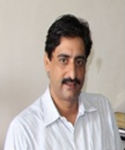
Prof. Manu Pratap Singh
Dr. B. R. Ambedkar University, India
Title: SOFT COMPUTING TECHNIQUE TO MINIMIZ THE LOCAL MINIMA PROBLEM IN PATTERN CLASSIFICATION
Abstract:
The back-propagation algorithm suffers with the local minima error surface for a large set of problems. A local minimum is defined as a point such that all points in a neighborhood have an error value greater than or equal to the error value in that point. These regions of local minima occur for combinations of the weights from the inputs to the hidden nodes such that one or both hidden nodes are saturated for at least two patterns. However, boundary points of these regions of local minima are saddle points. This paper describes the soft computing techniques for the performance evaluation of Back-propagation algorithm to recognize the hand written English alphabets. Two different architectures of neural network have been taken with five trials of each network. It has been analyzed that the conventional back-propagation algorithm suffers with the problem of not convergence the weights. The results of the experiments and result shows that the conventional back-propagation algorithm does not suites to solve the challenging problem most reliably and efficiently.
Biography:
Dr. Manu Pratap Singh received his Ph.D. in Computer science from Kumaun University Nanital, Uthrakhand, India, in 2001. He has completed his Master of Science in Computer Science from Allahabad University, Allahabad in 1995. He is currently as Professor in Department of Computer Science, Institute of Engineering and Technology, Dr. B.R. Ambedkar University, Agra, UP, India since 2014. He is engaged in teaching and research since last 19 years. He has more than 80 research papers in journals of international and national repute. His work has been recognized widely around the world in the form of citations of my research papers. He also has received the Young Scientist Award in computer science by international Academy of Physical sciences, Allahabad in year 2005. He has guided 18 students for their doctorate in computer science. He is also referee of various international and national journals like International Journal of Uncertainty, Fuzziness and Knowledge Based Systems by World scientific publishing cooperation Ltd, International Journal of Engineering, Iran, IEEE Transaction of fuzzy systems and European journal of operation research by Elsevier. He has developed a feed forward neural networks simulator for hand written character recognition of English alphabets. He has also developed a hybrid evolutionary algorithm for hand written character recognition of English as well as for Hindi language classification. In the hybrid approach the Genetic algorithm is incorporated with back propagation learning rule to train the feed forward neural networks. In this approach the genetic algorithm starts from the suboptimal solution and converges for the optimal solutions. There are more than one optimal solution has obtained. This approach leads for the multi objective optimization phenomena. Another hybrid approach of evolutionary algorithm is developed for the feedback neural network of Hopfield type for efficient recalling for the memorized patterns. Here also the randomness from the genetic algorithm is minimized by starting it from the suboptimal solution in the term of parent weight matrix for the global optimal solutions i.e. correct weight matrices for the network to consider it for efficient pattern recalling. His research interests are focused on Neural networks, pattern recognition and machine intelligence, soft-computing, etc. He is a member of technical committee of IASTED, Canada since 2004. He is also the regular member of machine intelligence Research Labs (MIR Labs), scientific network for innovation and research excellence (SNIRE), Auburn, Washington, USE, http://www.mirlabs.org, since 2012. His Google citation indices are h-11, i10-index is 13 and he has 434 citations. He has been invited as keynote speaker and invited guest speaker in various institutions in India and Abroad.